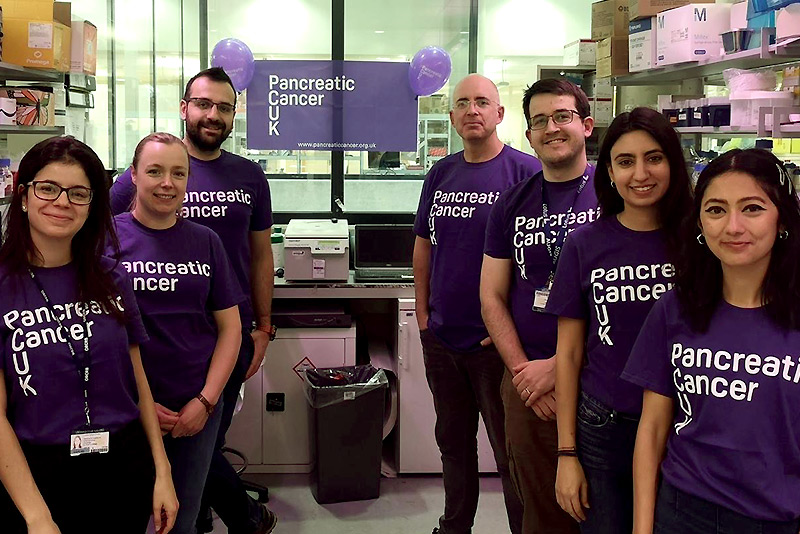Enabling pancreatic cancer research to flourish
Philanthropic support from the Kidani Memorial Trust has set pancreatic cancer research at Oxford on a new and powerful course.
The statistics for pancreatic cancer are poor by any measure: survival rates are the lowest of all common cancers, with a five-year survival of 7%, and they have not increased in over 40 years. Eric O’Neill, Professor of Cell and Molecular Biology in the Department of Oncology, hopes to change that.
‘Because the pancreas, an organ that controls blood sugar, is right in the middle of the body, tucked in behind your liver and underneath your stomach, it’s very difficult to tell when there’s something wrong,’ he says. ‘It’s insidious: it can be growing there for 10–15 years without any real symptoms.’
Jaundice, one of the most common symptoms, arises because the pancreatic cancer grows and blocks the liver. At this point only 20% of patients are operable, and only 20% of these respond well to the surgery. Professor O’Neill adds: ‘Some people have fantastic responses to therapy, but it’s an anomaly.’
 Eric O'Neill (back right) with colleagues at a Pancreatic Cancer UK pancreatic cancer awareness day at Oxford University © Oxford University Department of Oncology
Eric O'Neill (back right) with colleagues at a Pancreatic Cancer UK pancreatic cancer awareness day at Oxford University © Oxford University Department of Oncology
An initial donation of around £400,000 from the Kidani Memorial Trust in 2014 has had a transformational impact on pancreatic cancer research at Oxford. The funding was used to hire a junior clinician to work in a team along with Professor O’Neill, a senior clinician and two surgeons. Together they created a database of diagnostic material from 150 existing patients for analysis in as many new and novel ways as possible.
‘We were on the cusp of some really exciting findings,’ says Professor O’Neill. ‘We received a research grant from the Kidani Memorial Trust as a direct result of being able to show the progress we were making. And following on from that work, the Kidani Chair in Immuno-Oncology has been appointed, who will work to understand how established cancers and immune systems integrate. I think it’s vital that the strands of Kidani funding benefit each other because the combined impact is greater than the sum of its parts.’
‘The Kidani Memorial Trust was the rolling stone that got all this started. How much of a factor? It was the factor because it gave us an independence to be able to drive something forward’
Professor O’Neill stresses the importance of clinicians and scientists working together: ‘Most translational medicine works top down, so clinicians look for things that are wrong and try to figure out how to treat them. I work from the bottom up, asking: can we figure out how to make these cells work again? And this work needs to be relevant to the patient: for example, the surgeons want to understand which patients should have surgery and which should be treated with chemotherapy. The more we look at the mutant ‘KRAS’ gene – present in over 90% of pancreatic cancers, which is highly unusual in the context of cancers – and study any mutations around it, the more we could learn about why some people survive, and some people don’t.’
Important partnerships and relationships with other specialists in this field are now firmly established. ‘When I started there was very little pancreatic cancer research in Oxford. We are now one of five partners in a national strategy of precision medicine called the Precision Panc Consortium, which includes Cambridge and Glasgow universities,’ he says.
In addition, Professor O’Neill is the only non-clinician at the National Cancer Research Institute (a virtual cancer centre), as well as being on its specialist Upper GI (gastrointestinal) board; he attended an all-party parliamentary group inauguration for early diagnosis in pancreatic cancer; and he has set up collaborations with Cardiff University and, more recently, St Bartholomew’s Hospital in London. ‘We’re very outward looking,’ he says, ‘and I’m pleased that they’re happy to work with us on this too.’
Oxford is particularly fortunate in its ability to draw on key relationships in close proximity. ‘There’s a concentration of experts that’s very hard to get in other institutions because they don’t have the breadth of what Oxford has to deliver,’ says Professor O’Neill. ‘And people are at the top of their game. That’s why the philanthropic model works well here.’
‘Philanthropic support is absolutely golden because it allows you to get to the true heart of the matter. It’s the flexibility and the honesty of it’
Future plans are already in train and include: using artificial intelligence on the collected data to help identify patterns as signs of early stage pancreatic cancer; creating a new generation of clinician researchers trained to think in the same way as scientists; and, of course, establishing a working relationship with the Kidani Chair in Immuno- Oncology. Professor O’Neill shows no sign of scaling back ambition for pancreatic cancer research at Oxford any time soon.
What drives him? His passion for science is surpassed only by the earnest desire to deal a mighty blow to this devastating disease. He says: ‘At our outreach events, you meet survivors and those who have lost loved ones. They are just so grateful for all the effort that is being put in. You can see their appreciation that this work is being done.’
SUPPORT THE DEPARTMENT OF ONCOLOGY